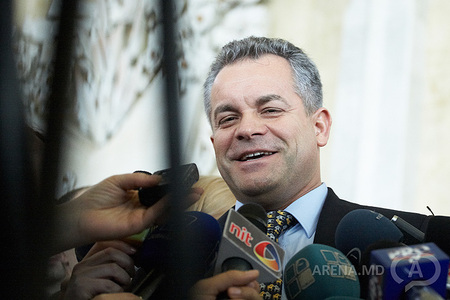
State Capture, Failing State: Moldova’s Twin Processes (Part One)
Publication: Eurasia Daily Monitor Volume: 12 Issue: 211
By:

Moldova’s internal collapse is, at last, concentrating the West’s attention. Western officials are generally surprised and aghast. They worry, moreover, about the potential repercussions in the region: Moldova does, after all, account for a 700-kilometer stretch of the Baltic-Pontic isthmus. Blindsided by the “Moldovan success story’s” implosion, Western governments are one year late in taking cognizance of the ongoing state capture and looming state failure in Moldova. They are only beginning to figure out what has happened, to whom to read the riot act in Moldova, whom to support there, and generally how to save the state as such. For the most part, they do not seem to have found the answers yet.
Last week (November 11–13), in Chisinau, a three-day conference of the North Atlantic Treaty Organization’s Parliamentary Assembly (NATO PA) focused, out of necessity, on Moldova’s internal crises and the wider vulnerabilities they generate. Thanks, in part, to being held in the local environment, this conference spotlighted the main problems accurately (Nato.int, November 19). It also achieved an unusually strong impact on the local media and political debates in Moldova. Also last week, Germany signaled the anointment of its Moldovan political favorite by receiving, in Berlin, former prime minister Iurie Leanca with his party-building team (Deutsche Welle—Romanian service, November 17).
The preceding week (November 6–7), on the sidelines of the Riga Conference (a major annual event), senior European, United States, and Moldovan officials brainstormed behind closed doors. But the talks resulted in little more than exhortations. And during the current week (November 16–18), in Brussels, European Parliament members and the European Commission confronted the visiting chairman of the Moldovan Parliament, Andrian Candu (billionaire Vladimir Plahotniuc’s godson), with questions about the improper role of “oligarchs” in Moldova’s government and the fate of the moribund “pro-Europe” coalition (Unimedia, November 16–18).
State capture and the failing state are intertwined processes in Moldova’s case. This is the second country in Europe’s East, after Georgia, to come under the informal political control of the richest local businessman, who exercises that control without accountability. But, while Bidzina Ivanishvili inherited a fully functional state from the Mikheil Saakashvili presidency in Georgia (indeed a top-performing state by Western-designed reform metrics), Plahotniuc is grasping at a dysfunctional state and shrinking economy in Moldova. Using non-transparent cash flows, apparently generated mainly from operations abroad, Plahotniuc seized the commanding heights in Moldova’s judiciary and law enforcement systems in the first stage of state capture, and has recently become the hegemon of Moldova’s political system (see below).
This development has politicized the problem of corruption in Moldova to unprecedented levels. Plahotniuc and his Democratic Party have operated under the “pro-Europe” coalition’s banner all along. He has not so much seized that description as it has been conceded to him, as part of that coalition, by Brussels officials in recent years. However, the “pro-Europe” parties’ ratings are collapsing into the single digits while pro-Russia parties’ ratings are surging; and Plahotniuc is the only player positioned to deal manipulatively with both flanks. He seems ideologically indifferent to completing his state-capture bid in alliance with pro-Russia parties, after having launched that bid under pro-Europe colors. Were Plahotniuc to complete his state-capture bid under whatever colors, Moldova would conclusively fail as a European state (see EDM, October 6, 19, November 3, 4).
Multiple government changes (including three interim governments in 16 months) and electoral campaigns have left Moldova without effective governance. The reform agenda has basically stalled, since the summer of 2014. The current government is again an interim one, with limited constitutional powers. The parliament is a hung one, splintered into mutually antagonistic parties, necessitating ad-hoc coalition-building, and unable to pass any major legislation since the November 2014 legislative elections. Hence, the parliament is literally shirking from legislative work, taking long breaks, holding plenary sessions infrequently, and basically voting governments in or out. All serial governments and prime ministers since summer 2014 have essentially been lame ducks, as is the current president, Nicolae Timofti, whose term expires next March. By that time, the parliament is expected to fail to elect a new head of state (just as in 2009–2012), thus triggering pre-term parliamentary elections. The Constitutional Court, meanwhile, has a track record of bizarre rulings. It has been packed with political appointees of two of the governing parties (Democratic Party and Liberal Party), which are simultaneously rivals to the main governing party (Liberal-Democrat Party). For the first time in more than 20 years, the idea is being seriously considered in Chisinau that the parliamentary system does not fit this country, generates chaos, and is inimical to reforms.
Amidst its political crisis, Moldova stands on the brink of de facto financial insolvency. It has been unable to pass a state budget for 2016 or to amend the 2015 state budget following the sharp depreciation of the national currency. Caused by the theft of $1.3 billion from Moldova’s banking system, the currency depreciation has increased the price of energy imports and, thus, of consumer tariffs. The European Union, other key Western donors, the International Monetary Fund (IMF), and even neighboring Romania (now with a growing economy and budget surplus) hold strong financial levers to motivate Chisinau in its own interest to implement the reforms foreseen by the Moldova-EU Association Agreement. All those donors and lenders have suspended their programs until Chisinau reconstitutes the “pro-Europe” coalition government, moves forward with overdue economic and judicial reforms, and demonstrates resolve in combating corruption.
None of those conditions are likely to be met—and certainly not in the form expected by Western officials—unless the West is willing again to countenance a pseudo-“pro-Europe” coalition, this time built around Plahotniuc and Candu’s Democratic Party, instead of the Liberal-Democrat Party. Contrary to the “pro-Europe” coalition’s agreement, the Democratic Party joined forces with the Communist Party and the Socialist Party in a two-stage political coup: lifting the immunity of Liberal-Democrat leader Vlad Filat and having him arrested (October 15), then joining forces again to remove the Liberal-Democrat prime minister Valeriu Strelet with the whole government (October 29).
At present, the Democratic Party acts as the center of gravity of a new coalition-in-the-making, the composition of which remains uncertain. Plahotniuc and Candu apparently reckon that Western officials would relent and provide at least some financial relief in order to see Moldova through the cold season without social upheavals. Negotiating, meanwhile, the composition of a new coalition, the Democratic Party holds on firmly to the law enforcement and judicial bodies under its political control (Ziarul National, IPN, November 16–18).




